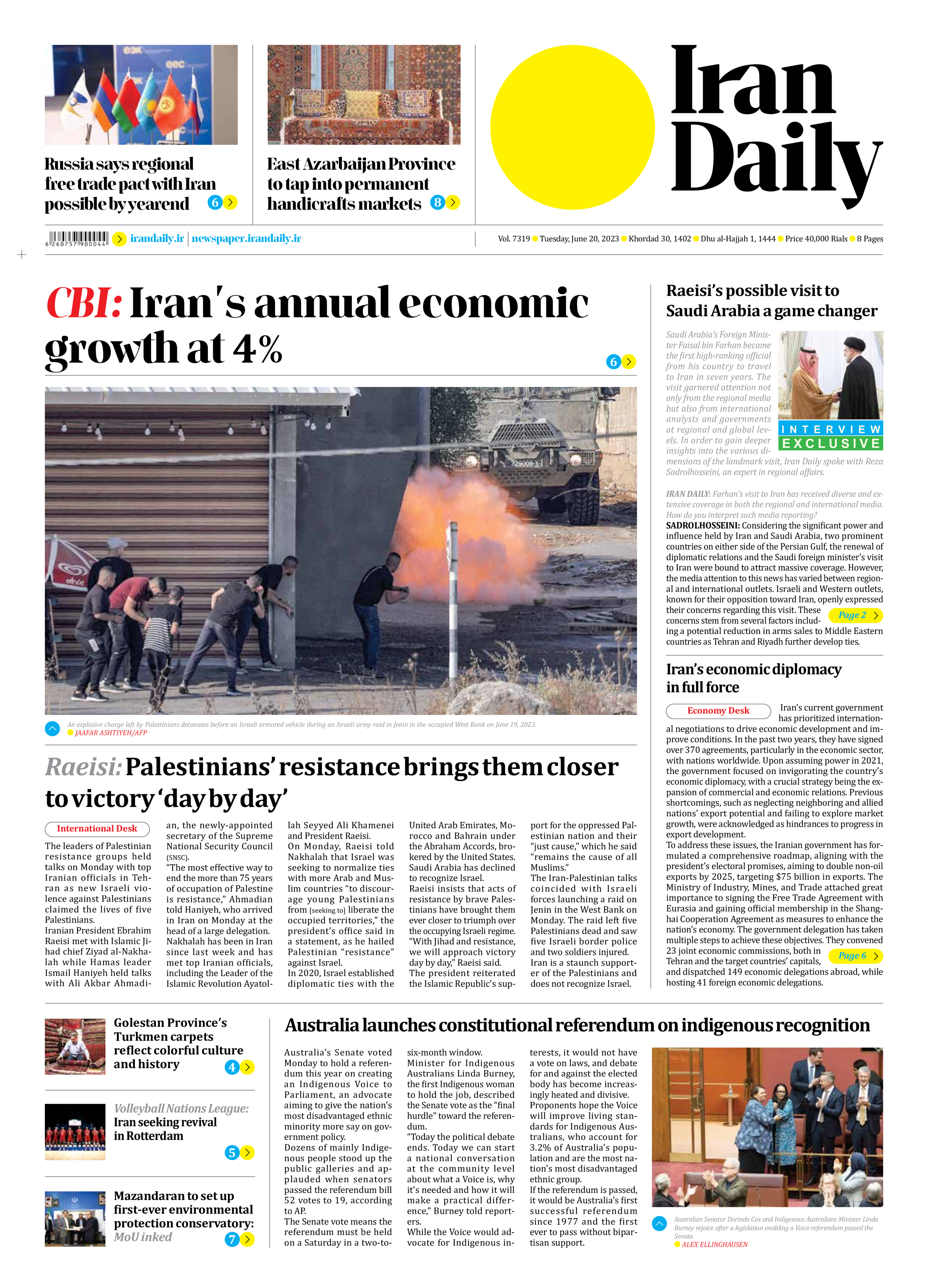
Raeisi’s possible visit to Saudi Arabia a game changer
Saudi Arabia’s Foreign Minister Faisal bin Farhan became the first high-ranking official from his country to travel to Iran in seven years. The visit garnered attention not only from the regional media but also from international analysts and governments at regional and global levels. In order to gain deeper insights into the various dimensions of the landmark visit, Iran Daily spoke with Reza
Sadrolhosseini, an expert in regional affairs.
IRAN DAILY: Farhan’s visit to Iran has received diverse and extensive coverage in both the regional and international media. How do you interpret such media reporting?
SADROLHOSSEINI: Considering the significant power and influence held by Iran and Saudi Arabia, two prominent countries on either side of the Persian Gulf, the renewal of diplomatic relations and the Saudi foreign minister’s visit to Iran were bound to attract massive coverage. However, the media attention to this news has varied between regional and international outlets. Israeli and Western outlets, known for their opposition toward Iran, openly expressed their concerns regarding this visit. These concerns stem from several factors including a potential reduction in arms sales to Middle Eastern countries as Tehran and Riyadh further develop ties.
Over the past four months, as the restoration of diplomatic relations between Tehran and Riyadh grew more serious, Arab countries have notably shifted their attitudes toward Iran, demonstrating a clear interest in deepening their relations with Tehran. Naturally, this development has raised concerns among Israel and its Western allies.
Furthermore, an additional cause for their apprehension lies in the potential collaboration between Iran and Saudi Arabia in addressing the Palestinian issue, which poses a threat to Israel’s political influence and propaganda efforts.
Another source of worry pertains to economic and energy matters. Iran holds the largest reserves of natural gas, while Saudi Arabia is the leading oil producer. Consequently, Tehran and Riyadh could potentially play a joint role in the energy sector in the near future, the outcomes of which remain unclear for Western countries.
In contrast, regional media predominantly portrayed the Saudi foreign minister’s visit in a positive light, recognizing the thaw between Tehran and Riyadh as beneficial for regional security and economic advancement.
Farhan delivered an official invitation from the Saudi king to Iranian President Ebrahim Raeisi to visit the kingdom. Does this invitation signify a push toward strengthening relations?
In the realm of international affairs, embassy activities are considered customary, and having an embassy alone does not necessarily reflect the quality of relations between two nations. However, the Saudi invitation demonstrates Riyadh’s keenness to enhance relations with Tehran and address remaining challenges between the two countries. Raeisi’s possible visit to Saudi Arabia would undoubtedly bring about significant security, political and economic developments for both nations and the wider Middle East.
Do you believe that Tehran-Riyadh relations will remain confined to security and politics, or do you foresee a gradual expansion into economic cooperation?
Typically, economic cooperation and the identification of shared economic interests can bolster the political and security ties between nations. However, it is through diplomatic relations that the essential groundwork for establishing economic cooperation is laid. Given the absence of political relations and certain misunderstandings, Iran and Saudi Arabia were compelled to initiate the restoration of their ties from a security perspective and subsequently proceed to the political phase. Thus, until diplomatic relations are established and both countries have embassies in place, the natural progression into the economic phase of cooperation cannot occur.
Notably, the statements made by the foreign ministers of both countries in Tehran emphasized the significance of economic and trade relations. Fundamentally, one of the primary reasons behind Saudi Arabia’s shift in approach toward Iran is a transition from a security and military-focused approach to a political and economic one. Therefore, it is highly probable that the reestablishment of political relations will pave the way for economic cooperation, particularly considering the substantial potential that exists for both Iran and Saudi Arabia.







